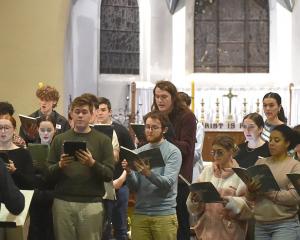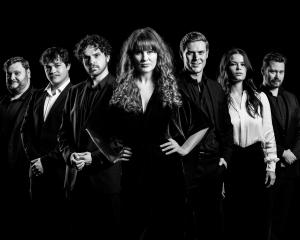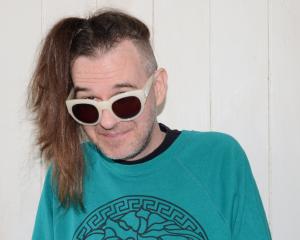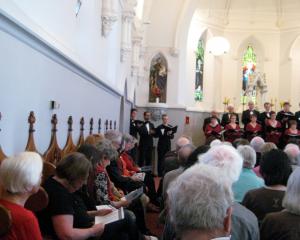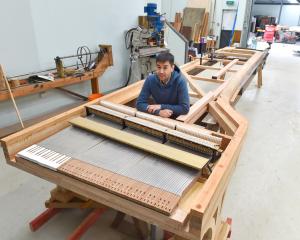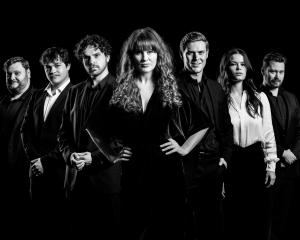
Babies? Well, in the case of founding member and drummer Matt Osment, yes. He left the band in late 2006, trading a restless life on the road for a relationship.
He now lives in Te Awamutu and has one child and another on the way. As for the rest of the band, they've spent a good deal of the past year in Germany.
They still like their rock'n'roll. It's just that, after more than a dozen years of thrashing sound systems, they also like a bit of quiet time.
Guitarist Phil Buckle, otherwise known as, um, Phil Datsun, arrived back in New Zealand a couple of weeks ago.
He and new drummer Ben Cole were joined by guitarist Christian Livingstone and singer-bassist Dolf de Borst earlier this week in preparation for a national tour, mainly comprising university orientation gigs.
On the phone from Auckland, Buckle says it's his first trip home for a year. He prefers to make at least one visit annually, often tying it in with a tour. Because many of the big European music festivals are held in the northern hemisphere summer, it makes sense to return at this time.
The Datsuns have lived in the northwest German town of Gutersloh for the past eight months. Lured from London by ‘‘a guy who had a really good studio with some good gear'', they also wanted to live somewhere cheaper and closer to the country. A European base has allowed them the luxury of heading off to do weekend shows rather than having to always hit the road for extended periods.
‘‘I hate to say it, but we're trying to have some sort of balance,'' Buckle says. ‘‘There is only so long you can live out of a suitcase. You live in an alternate reality; it's in no way a settled life . . . we were doing nine or 10 nights on and one night off for a while, for 21 months or so. We'll probably try to slow things down a bit, take it easy, really.
‘‘When we were first out there, on the international scene, things were just coming at us. We were just riding on whatever we could get.
"Plus, we were keen as mustard to travel and see all these places. Now we've been to those places a few times. I think it is just about finding some balance, being happy with the songs and playing shows but not being rundown all the time.''
That workload has had its price, Buckle concedes, with Osment leaving the band in October 2006, prompting the remaining members to take stock.
‘‘We'd been the same four guys the whole time and things were getting a bit hard and the stresses were starting to show. It was hard realising we had to have a bit of a break, but I'm really good mates with Matt still.
"We were down in Raglan last week, hanging out at the beach . . . You can't spend so much time with someone and then just cut him off.''
Buckle emphasises life is still good for the Datsuns. Their music still pays the rent (their revenue is largely derived from touring) and they still like playing music.
‘‘All of our focus goes into the songs; everyone is writing heaps more songs now; the creative juices are still well and truly there . . . It's still great fun playing the shows and seeing people getting into the new songs as much as the old songs.''
Some more notable recent European gigs have included a ship voyage along the Swedish coast, playing to 2000 Scandinavians drunk on tax-free liquor, and a 24-hour motorcycling festival in France that Buckle likened to a set from a Mad Max film.
‘‘That's the great thing about Europe - you can drive about the distance it is from Auckland to Wellington and be in a completely different environment, culture and language.''
The recruitment of new drummer Cole, an old schoolmate from Cambridge, has also reinvigorated the group.
‘‘He's a really great guy, a mellow, level-headed guy,'' Buckle enthuses. ‘‘Also, one of the great things about it is that when he joined the band, he hadn't even left New Zealand, so it gave us a bit of a spark touring around again because we were showing an old mate around some of the places we'd seen.''
Cole was working in a Wellington cafe when he was asked to join the band. He was told to ‘‘think about it'', that the Datsuns' lifestyle would challenge different areas of his life. He didn't take long to make up his mind.
‘‘He came over to England and within three days he learnt 23 songs. The next day, we went around Europe on tour for six weeks. He nailed it. There was no question whether it was going to work or not.
The first jam we had with him was one of the best we've ever had. It was such a good sign. A lot of the first jams we had, a couple of them turned into songs that will be on the record.''
Record? Yes, the Datsuns have been working on a new, fourth album, scheduled for release midyear.
They've been bouncing between Gutersloh and Gothenberg, doing pre-production in Germany before heading into a friendly Swedish band's studio to complete tracks. Although a few more songs may be added to the list of contenders, much of the material has been completed.
‘‘We've recorded the final versions of 16-17 songs,'' Buckle explains. ‘‘What is going to end up on the album, we don't know. We might even do some more recording, as there are so many songs floating around. We might even do a seven-inch or release something for the [New Zealand] tour, just to tick things over a bit.''
Among the 10 tracks on the Datsuns' last album, 2006's Smoke and Mirrors, were a few that stood apart because of their greater complexity in both arrangement and execution.
Stuck Here for Days included acoustic slide guitar; Waiting For Your Time to Come was one of the band's more poppier moments; and All Aboard featured gospel-type vocals. Certainly, they were a long way from early single MF From Hell. So what, then, can fans expect of the new album?
‘‘In some areas, it's back to basics,'' Buckle says. ‘‘Even on our first couple of albums, there are elements of different things, although more so on the last record.
"It's even more like that. There's stuff that is more poppy, more gospel . . . There is a song that sounds like we're a 12-yearold punk band; there's a song that sounds like we're a '50s do-wop band; there's a song that sounds like the B52s, another that sounds like the Beatles' White Album meets Jimi Hendrix . . . but it all sounds like us.
‘‘We're obviously fans of completely different music and the four of us have completely different personalities, but as we explore each of our own musical interests, it all seems to come together. There are no discussions about what we're doing. We don't say, ‘oh yeah, let's write a song like the B52s'.''
Notably, the new album is self-produced, as was Smoke and Mirrors. The Datsuns have had producers before. Led Zeppelin bassist Jon Paul Jones worked on their second album, 2004's Outta Sight/Outta Mind, but the band members like to be their own bosses.
They always have done: since their self-titled 2002 debut, they have released music on their own label, Hell Squad, with the band then licensing it to larger companies.
It means fewer people take a piece of the pie and it also allows the Datsuns the freedom to choose who will best market their songs.
‘‘We've made the record. Now we've got to deal with the other end of the spectrum - with people who think they have an idea about marketing.''
Marketing. Buckle almost spits out the word. It evokes memories of a British music media only too keen to raise high a band in order to proclaim its downfall. In 2002, NME put the Datsuns on its cover. They were hailed as ‘‘heroes of the new rock revolution''. By the end of 2006, the editors' interest in the band's third album was noticeably absent.
‘‘If you do start believing what people are saying and don't realise they are just trying to sell magazines, that they don't actually give a s . . . and the people who are reviewing your record don't even listen to the record . . . finding out stuff like that, you just have to laugh at it. If someone says you're the greatest band in the world, you just have to say, ‘What? No, we're not'.
‘‘Sometimes I wish I'd never found out so much about the industry over there because if you're not careful, it can turn you quite cynical. Everything is focused on fashions and trends over there. All of the things that they're focusing on are on the periphery of music. We were the centre of attention for a while there and then, after a while, seeing it for what it is, it makes you focus on the things that you want to do.
‘‘So we kept following our own path, which led us to meet some guy who had some studio in Germany . . .''
Once the Datsuns have played their seven New Zealand shows, they will head to Australia and then the United States for more gigs. There is the prospect of touring South America, though plans have yet to be finalised.
Like the best lead guitar solos, the random wandering brings excitement. ‘‘I think we'll be back to the suitcases for a while,'' Buckle muses, adding the band members aren't sure where they'll be based on their eventual return to Europe.
‘‘Who knows? Basically, with the lifestyle we lead, we can plan about two months in advance. Everything is pencilled in and subject to change.''
The Datsuns play at Union Hall, University of Otago, on Friday, February 22, supported by The Situations and KOTAC.


